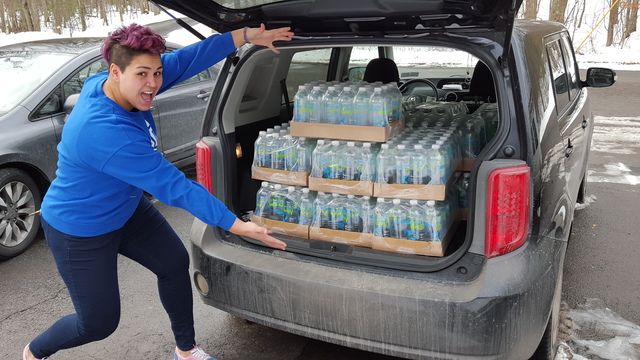Click here to subscribe today or Login.
KINGSTON — As a local woman and two of her friends drove to Flint, Michigan, to deliver water and money they had raised, the state Department of Health has concluded the “primary source for childhood lead poisoning in Pennsylvania continues to be exposure to aging, deteriorating lead-based paint (chips and dust)” and not the water supply.
State Rep. Aaron Kaufer, R-Kingston, issued a news release Friday stating a recent news article has brought “heightened concerns from my constituents,” as well as others throughout Pennsylvania.
Kaufer said he has been contacted by several constituents regarding lead contamination in Pennsylvania, comparisons to Flint, Michigan, and a 2014 Childhood Lead Surveillance Annual Report from the Department of Health. He said the article is “going viral” on social media, causing people to reach out to him.
Kaufer is asking all appropriate state agencies to look into the issue to alleviate the concerns of lead contamination in the state and the steps being taken to ensure the public’s safety and the people’s constitutional right “to clean air [and] pure water.”
Referring to a recent health department report, Kaufer said while the report shows major strides have been taken, pockets of vulnerability still exist throughout the state, including the Scranton/Wilkes-Barre area.
Kaufer has asked a joint public hearing be held with the Department of Environmental Resources and Energy Committee to better address the concerns and provide the public with steps the state government is taking to ensure the general health of people.
Wolf Administration responds
Gov. Tom Wolf ‘s administration stated Friday that national events about lead exposure have generated new concerns for Pennsylvanians related to the safety of their homes and water.
According to a release from the governor’s office, “The Wolf Administration takes the issue of lead exposure very seriously and state agencies will continue to work together on their coordinated response to address lead exposure in communities across the commonwealth.”
The report states the age of Pennsylvania’s housing stock contributes to the problem. While lead was banned from paint in 1978, many older dwellings still contain layers of pre-1978 paint. According to 2010 census data, Pennsylvania ranks third in the nation for having the most housing units identified as having been built before 1950 (when lead was more prevalent) and fourth in the nation for housing units identified as having been built before 1978, according to a 2014 Department of Health report.
“The Department of Health is very concerned about elevated lead levels in children wherever they may occur,” said Health Secretary Dr. Karen Murphy. “Our community health nurses work closely with health care providers and families every day to provide education about lead exposure and facilitate home inspections if needed to identify the source of the exposure.”
According to the health department report, Luzerne County ranked in the top one-third of Pennsylvania counties with the highest percentage of children under the age of 7 who were tested for elevated levels of lead.
The health department report shows the number of children tested and shown to have elevated lead in their blood levels in 2014 dropped by 6.8 percent over the previous year.
Department of Environmental Protection Secretary John Quigley said protecting the state’s water and the health and safety of citizens is DEP’s mission.
“Ensuring the safety of our drinking water is essential,” Quigley said. “We have policies and programs in place already to protect Pennsylvanians.”
The Department of Health provides a toll-free Lead Information Line — (1-800-440-LEAD) — to respond to caller questions and provide electronic materials about lead poisoning and other environmental hazards.
According to DEP, federal and state regulations require that public drinking water suppliers regularly test for contaminants, including lead. DEP monitors water suppliers to ensure they are complying with testing requirements to safeguard public drinking water supplies.
Local support for Flint
Instead of partying on her 27th birthday Jan.30, Jade Dudley, of Mountain Top, decided to help the people of Flint, Michigan, with their water crisis. Dudley received 20 cases of water donated from Nature’s Way in Pittston and raised $1,500 on her gofundme.com account. Her co-workers at Wesley Village also helped.
Dudley and her two best friends — Celeste Mazzoni and Anna Lengyel — left on a Friday after working all day and drove to Flint for the weekend with the water in tow. They also used half of the $1,500 to purchase more water.
Dudley said they stopped at a shopping plaza where water was being distributed and they distributed cases of water to Flint daycare and nursing homes.
“The people were so grateful,” she said. “We had mixed emotions. We felt blessed to be able to help people, but it opens your eyes to realize how big the problem is in Flint and what needs to be done.”
Dudley said she was browsing on Facebook when she saw a few articles about the crisis in Flint and decided to give something back. She continues to collect donations and said she will do what she can for people in need in NEPA or across the country.






